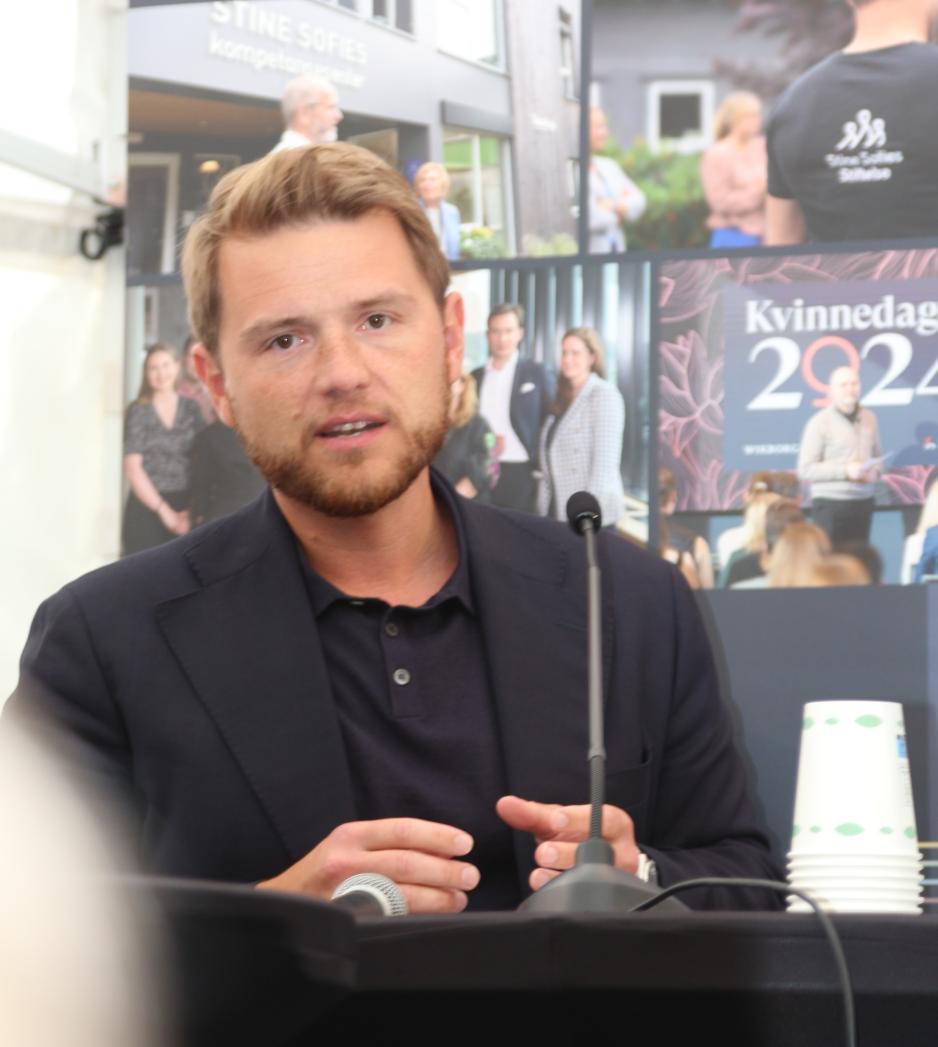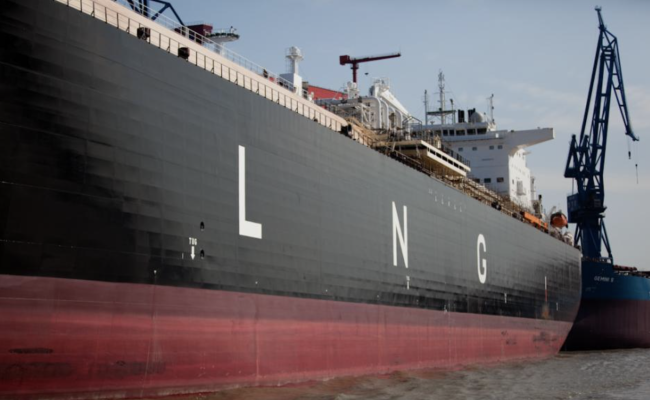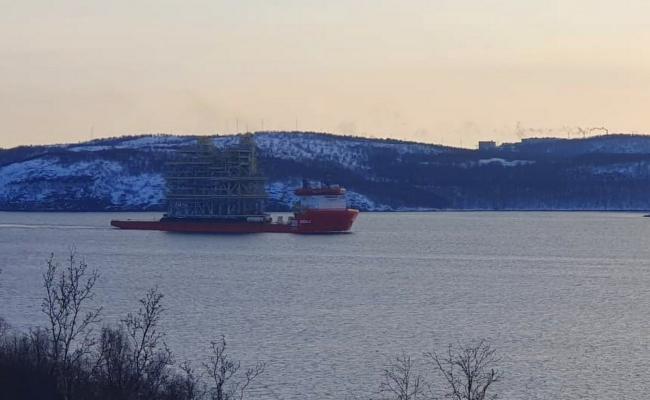The Arendal Week: “If We Stop the Oil, We Stop the War”
Senior Advisor Aage Borchgrevink from the Norwegian Helsinki Committee at the Arendal Week. (Photo: Trine Jonassen)
Arendal (High North News): The EU's sanctions package against Russia has become so extensive that it is nearly impossible not to violate them. "If the purpose is to stop the war in Ukraine, it must be easier for all parties," says Aage Borchgrevink from the Norwegian Helsinki Committee.
Russia's continuous evasion of EU economic sanctions is a problem, and it is very significant to Russia's ability to continue waging war in Ukraine via oil export, as well as preserve the supply of goods, technology, and money as a direct result of sanctions evasion.
"The sanctions regime is so complicated now, with 14 sanction packages at over 1,200 pages, that it is hard for businesses to navigate," says Senior Advisor Aage Borchgrevink from the Norwegian Helsinki Committee.
At the Arendal Week, he participated in a debate on the economic sanctions against Russia with representatives from the Norwegian MFA, the Kongsberg group, the law firm Wikborg Rein, and the Police Security Service (PST).
Grey area
Activities evading sanctions are activities which in themselves do not violate sanctions, but they aim or result in sanction violation. Such activities become illegal and criminal evasion if the fault claim is met, Wikborg Rein explains.

Lawyer Håkon Stalheim Meldahl from the law firm Wikborg Rein at the Arendal Week. (Photo: Trine Jonassen)
For example, it is forbidden to directly or indirectly transfer certain types of technology to Russia, but if a business's technology winds up in Russia via a third party, it can be difficult to determine whether this is an indirect transfer in violation of the sanctions or whether it is illegal circumvention of the sanctions.
Many countries do not have sanctions against Russia and countries who trade with these can break sanctions.
Not enough done
"Now it is also a violation of sanctions to not do enough to counter the evasion of sanctions by introducing special requirements to avoid circumvention, such as requirements for contract provisions to prevent further exports to Russia for certain goods. This has thus become very complicated", comments lawyer Håkon Stalheim Meldahl from the law firm Wikborg Rein.
Aage Borchgrevink believes not enough is done to stop Russia's violations of human rights in Ukraine.
"A full economic boycott, like Norway has against South Africa, is the next step to weaken Russia and stop the war. If the intention is to stop the war in Ukraine, it must be easier for all parties. The sanctions are having an effect, but I fear that new sanctions packages will continue coming," says Borchgrevink to High North News.
There now
And full economic boycott is the answer?
"Yes, like in South Africa in the 80s. That was effective."
I believe we are already there.
Is this something being discussed in the EU?
"No, I don't think the EU would do that. But unforeseen things could happen and it could abruptly change the situation. If so, we must have thought about it," he says and adds:
"I believe we are already there."
Most important source of income
Borchgrevink believes that the EU, spearheaded by Denmark and Sweden, also must do more to stop Russia's biggest source of export and most important source of income: the oil.
"This is an industrial war dependent on large resources. And Russia's most important export is oil. Oil export constitutes Russia's main income to keep the war machine going."
Also read (the article continues below)
Introduced price ceiling
In an attempt to stagnate the income, the EU countries introduced a price ceiling on Russian oil of 60 dollars per barrel before Christmas 2022. The price ceiling was intended to reduce Russia's income from the sale of petroleum products to third countries.
"The response from Russia was to create a shadow fleet of about 300 to 400 oil tankers with unclear ownership and insurance. The price ceiling does not apply to these. Therefore, the measure does not work," says Borchgrevink.
Putin's shadow fleet consists of ships that transport oil, gas, and coal from Russian ports to countries that are not bound by Western sanctions against Russia. These old tankers, with unclear ownership and unknown insurance, pose a real safety risk in Nordic waters.
The shadow fleet
But the senior adviser believes the EU can do something about that. These ships transport oil to and from Russia via the Baltic Sea. The ships pose a safety risk, and there is no guarantee regarding accidents and oil spills, either on purpose or by accident.
"Denmark and Sweden control øresund, like the old Viking kings, and can stop Russia's export. The Convention on Law of the Sea has developed since then, so this is not easy for the EU. But it would be more efficient in weakening the Russian economy, says Borchgrevink.
Håkon Lindteigen from the Kongsberg group, Senior Adviser Aage Borchgrevink from the Norwegian Helsinki Committee, and Vegard Pedersen from the PST at the Arendal Week. (Photo: Trine Jonassen)
"The possibility is there. Stopping the shadow ships' voyage to oil terminals near St. Petersburg via Øresund is crucial. If we stop the oil, we stop the war."
This summer, Denmark's MFA Lars Løkke Rasmussen informed that he has invited a group of allied countries to assess how they can introduce measures against the shadow fleet without specifying what kind of measures.
One step ahead
What does the extent of sanction evasion mean for Ukraine?
"Russia is dependent on Western technology. Every day, sophisticated Russian weapons hit Ukraine, and they contain a considerable amount of Western components. We must stop this," says Aage Borchgrevink.
Although he believes that the sanctions are working and that the Russian economy is struggling, he accuses the EU of being too slow, making Russia always one step ahead.
Prioritized goods
In a report on violations of sanctions published last year, the Norwegian Helsinki Committee pointed to a list of prioritized goods that are especially important to Russia's war industry.
Many trucks are lost in Ukraine.
"Prioritized goods especially important to Russia's war in Ukraine are still imported, such as ball bearings, computer chips, and more. In general, imports of these goods appear to be declining, which must have consequences for Russia's warfare. However, a critical import for Russia is trucks, says Borchgrevink.
Much of the war revolves around logistics, and Borchgrevink says that Russia's import of trucks multiplied last winter.
"Many trucks are lost in Ukraine. Restricting access to these would be useful."
Increase in violations
Vegard Pedersen, section leader for counterintelligence in PST, says that they see a relatively large scale and marked increase in sanctions violations, with Russia being the most prominent actor.
"But often there are no deliberate violations on the Norwegian side," says Pedersen, confirming a complicated set of regulations.
Norway is particularly interesting to Russia because of its underwater technology.
Own directorate
"We have concrete examples of Russian intelligence helping to get this from Norway," says Pedersen.
PST is seeing an actor that is getting more and more creative in its evasion of the sanctions.
The sanctions and the work surrounding them are now such a big part of the MFA that an own directorate will be in place from January 1st, 2025, to manage them.
Harriet E. Berg has been appointed the director of the new Directorate of Export Control and Sanctions (DEKSA), which will act as regulatory owner, manager of exemption provisions, and responsible for export control.
"The EU has published detailed guidelines, and there is still some legal trade with Russia. But we see that the sanctions regulations have become so complicated that it is difficult to manage," concludes lawyer Håkon Stalheim Meldahl.





